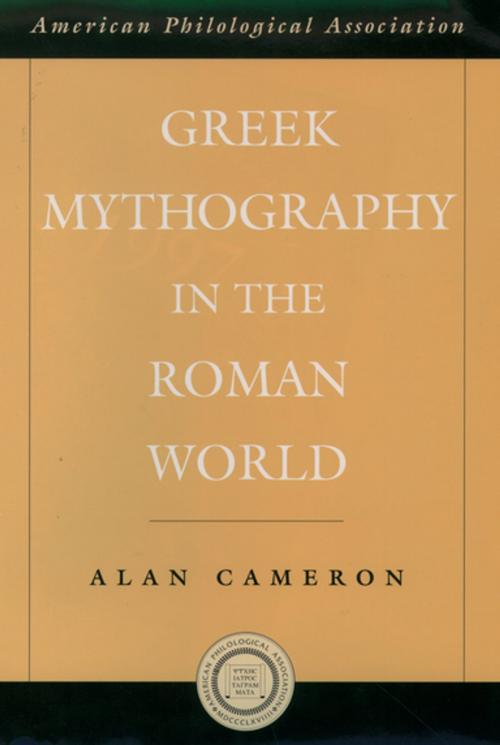Greek Mythography in the Roman World
Fiction & Literature, Literary Theory & Criticism, Ancient & Classical, Nonfiction, Social & Cultural Studies, Social Science, Folklore & Mythology, History, Ancient History, Rome| Author: | Alan Cameron | ISBN: | 9780190291099 |
| Publisher: | Oxford University Press | Publication: | September 2, 2004 |
| Imprint: | Oxford University Press | Language: | English |
| Author: | Alan Cameron |
| ISBN: | 9780190291099 |
| Publisher: | Oxford University Press |
| Publication: | September 2, 2004 |
| Imprint: | Oxford University Press |
| Language: | English |
By the Roman age the traditional stories of Greek myth had long since ceased to reflect popular culture. Mythology had become instead a central element in elite culture. If one did not know the stories one would not understand most of the allusions in the poets and orators, classics and contemporaries alike; nor would one be able to identify the scenes represented on the mosaic floors and wall paintings in your cultivated friends' houses, or on the silverware on their tables at dinner. Mythology was no longer imbibed in the nursery; nor could it be simply picked up from the often oblique allusions in the classics. It had to be learned in school, as illustrated by the extraordinary amount of elementary mythological information in the many surviving ancient commentaries on the classics, notably Servius, who offers a mythical story for almost every person, place, and even plant Vergil mentions. Commentators used the classics as pegs on which to hang stories they thought their students should know. A surprisingly large number of mythographic treatises survive from the early empire, and many papyrus fragments from lost works prove that they were in common use. In addition, author Alan Cameron identifies a hitherto unrecognized type of aid to the reading of Greek and Latin classical and classicizing texts--what might be called mythographic companions to learned poets such as Aratus, Callimachus, Vergil, and Ovid, complete with source references. Much of this book is devoted to an analysis of the importance evidently attached to citing classical sources for mythical stories, the clearest proof that they were now a part of learned culture. So central were these source references that the more unscrupulous faked them, sometimes on the grand scale.
By the Roman age the traditional stories of Greek myth had long since ceased to reflect popular culture. Mythology had become instead a central element in elite culture. If one did not know the stories one would not understand most of the allusions in the poets and orators, classics and contemporaries alike; nor would one be able to identify the scenes represented on the mosaic floors and wall paintings in your cultivated friends' houses, or on the silverware on their tables at dinner. Mythology was no longer imbibed in the nursery; nor could it be simply picked up from the often oblique allusions in the classics. It had to be learned in school, as illustrated by the extraordinary amount of elementary mythological information in the many surviving ancient commentaries on the classics, notably Servius, who offers a mythical story for almost every person, place, and even plant Vergil mentions. Commentators used the classics as pegs on which to hang stories they thought their students should know. A surprisingly large number of mythographic treatises survive from the early empire, and many papyrus fragments from lost works prove that they were in common use. In addition, author Alan Cameron identifies a hitherto unrecognized type of aid to the reading of Greek and Latin classical and classicizing texts--what might be called mythographic companions to learned poets such as Aratus, Callimachus, Vergil, and Ovid, complete with source references. Much of this book is devoted to an analysis of the importance evidently attached to citing classical sources for mythical stories, the clearest proof that they were now a part of learned culture. So central were these source references that the more unscrupulous faked them, sometimes on the grand scale.















